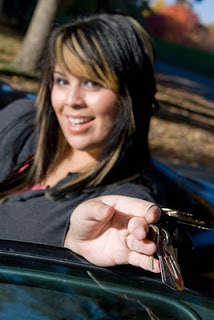
Five Tips After Teens Get Their Driver’s License
October 8, 2010
Once a teen gets their driver’s license, they will want to apply their new skill all the time. Some teens even volunteer to be the family driver and errand runner! (Depending on what age, and what kind of license they have.) But just because they have their license, the process of learning to drive isn’t over. Driver’s Education is continuing education, and there are still several things to tackle.
Here are a few tips for teens after they get their license:
- Encourage your parents to sign a parent-teen driving contract. If you don’t have one set up already, then show the initiative. Be the teen who demonstrates to their parents or guardian that they are willing to agree to some terms if they are going to help shoulder the responsibility of driving. It will save you both from any misunderstandings, over-reactions, and hard feelings, on the interpretations, expectations and consequences of your driving privilege.
- Practice, practice, practice. Though the teen may have his/her license, it’s easy for them and their parents to get complacent. While they may be skilled on how to drive, mastering and fine-tuning their skills only comes with experience. There’s still always much to master when it comes to driving, and asking a parent for help more not only increases that teen’s driving ability and safety, but also makes him/her bond closer with their parent. The evolution from learning to drive to becoming a safe and defensive driver is a long term progression. Parents need to stay engaged through out the process.
- Clear the dashboard. Like life, teens should remove unnecessary distractions when it comes to driving. Have disc-changers ready and music set before starting the vehicle. Keep cell phones in the glove compartment away from the driver’s reach. Also important, don’t be a chauffeur for friends. Having other teens in the car is a major form of distraction while driving, and research shows it increases the risk of a crash per passenger, exponentially.
- Clear your head someplace else. Driving isn’t a stress-reliever. When a teen has a problem, he/she shouldn’t use driving to clear his head. When a preoccupied mind does something that requires full attention, like driving, there is more likely to be mistakes. Having a talk with a friend, when you are not doing something else (like driving) is one of the best ways to cool one’s head. Driving when you are upset, angry or even extremely happy can be dangerous.
- Check the labels. Before taking any form of medication, even over-the-counter drugs, remember to check the labels. Some drugs have side-effects when taken, which may include dizziness or drowsiness. Either of which is never good for driving. Some medicines may give off false driving-under-the-influence signals. Make sure you are rested and in good health. Your physical health and well being can affect awareness, judgment and reaction time each important for safe driving.
Having your driver’s license does not mean you are good to go. In order to be a safe driver, there is still continuing education needed and defensive driving techniques to learn. Take advantage of this time to continue to be engaged in driver education as you gradually increase the opportunities and responsibilities driving brings.
